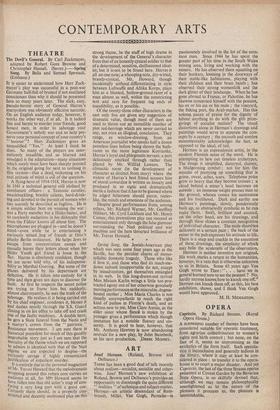CONTEMPORARY ARTS
THEATRE
The Devil's General. By Carl Zuckmayer, adapted by Robert Gore Browne and Christopher Hassall. (Savoy.)—Spring Song. By Bella and Samuel Spewack. (Erhbassy.) IT is easier to understand how Herr Zuck- mayer's play was successful in .a post-war Germany half,full of bruised if not mutilated consciences than why it should be presented here so many years later. The slick, easy, pseudo-heroic story of General Harras's martyrdom was obviously effective narcotic. On an English audience today, however, it works the other way, if at all. Is it indeed fine and heroic to murder your friends, good honest men, in order to sabotage your Government's unholy war and so help pre- serve your personal concept of your country's " honour"? Herr Zuckmayer gives an unqualified "Yes." At least I think he does. So many of the players are inter- mittently inaudible, and so blurred and smudged is the adaptation—many situations which surely must have been sharply pointed in the original going for next to nothing in this version—that a dead reckoning on his real attitude of mind is out of the question.
A flying,hero of 1914-1918, Harras is now in 1941 a technical general still idolised by combatant officers : a Teutonic cavalier, swashbuckling, brashly caustic, hard-drink- - ing and devoted to the pursuit of women who can scarcely be described as fugitive. He is a simple soldier bent on winning the war : not a Party member but a Hitler-baiter, and so carelessly audacious in his disloyalty that even the Fiihrer knows all about him. The microphones are plugged in—and he doesn't mind—even while he is entertaining a curiously mixed _bag of friends at Otto's plushy Berlin restaurant. He helps Jews to escape from concentration camps and casually leaves their letters about when his- Hitler Youth girl friend is loose in the fiat. Harras is absolutely confident, though• we are never told why, of his indispensa- bility to Marshal Goering. But some of the planes delivered by his department are defective. He is taken into custody for a time and then given ten days to discover the fault. At first he suspects the secret police are trying to frame him but suddenly, almost clairvoyantly, he sees the truth of the sabotage. He realises it is being carried out by his chief engineer, condones it, blesses it and dashes noisily through the S.S. Guard closing in on his office to take off and crash one of the faulty machines. A double hero, he gets a State funeral from the Nazis and a martyr's crown from the " patriotic " Resistance movement. I am sure there is historical precedent for much of this gaudily improbable story just as I am sure that the morality of the theme which we are supposed to admire is identical with that of the Nazi regime we are expected to despise—the curiously savage if highly romanticised Justification of expedient murder. It is entirely due to the personal magnetism or M r. Trevor Howard that the melodramatic Wrapping around this rotten core carries an audience at all, for Mr:. Howard seems to have fallen into that old actor's trap of con- fusing a very long part with a good one. Certainly there should, in a properly con- structed and decently motivated play on this strong theme, be the stuff of high drama in the development of the General's character from that of an honestly cynical soldier to that of a determined, sensitive, disillusioned ideal- ist; but it is not to be found here. Harras is all on one note; a whooping note, dry-witted, brandy-cynical. Mr. Howard, though incidentally without differentiating in style between Luftwaffe and Afrika Korps, plays him as a blunted, hollow-ground razor of a man almost as well, within the constricting text and save for frequent tag ends of inaudibility, as is possible. Of the twenty-three other characters in the cast only five are given any suggestion of dramatic value, though most of them are used to throw out an incredible number of plot red-herrings which are never carried to any, not even an illogical, conclusion. They range, as window-dressing, from an American journalist who speaks half a dozen pointless lines before being shown the bath- room to the more legitimate Korrianke, Harras 's loyal and phlegmatic servant, a part deliciously smirked through rather than played by Mr. Wilfrid Lawson. The climactic scene (in the development of character as distinct from story) where the widow of Harras's best friend accuses him of moral cowardice is written so loosely and produced in so static and dramatically sterile a fashion that it has to be guessed where its edged bitterness should pierce, rapier- like, the minds and emotions of the audience.
Despite good performances from, among others, Mr. Richard Warner, Mr. Geoffrey Hibbert, Mr. Cyril Luckham and Mr. Henry Comor, this pretentious play can succeed as entertainment only through the false glamour surrounding the Nazi political and war machine and the here thwarted brilliance of Mr. Trevor Howard.
Spring Song, the Jewish-American play which was seen some four years ago at the Saville, has the peculiar charm of mono- syllabic domestic tragedy. Those who like it love it, and those who find its reach-me- down naiveté insupportable do not, except by misadventure, get themselves entangled in its web. In this long-drawn-out revival Miss. Miriam Karlin wrings a little too pro- tracted agony out of her otherwise genuinely moving performance as the miserable, dogma- bound mother ; Miss Maria Charles is too tinselly unsympathetic to reach the right kind of pathos in Florrie's death, and an actress new to me, Miss Care Austin, as the elder sister whose fiancé is stolen by the younger gives a performance which though immature has a notable fluency and sin- cerity. It is good to hear, however, that Mr. Anthony Hawtroy is now abandoning revivals- for a new play, by John Steinbeck, as his next production. Panic MONSEY.


















































 Previous page
Previous page